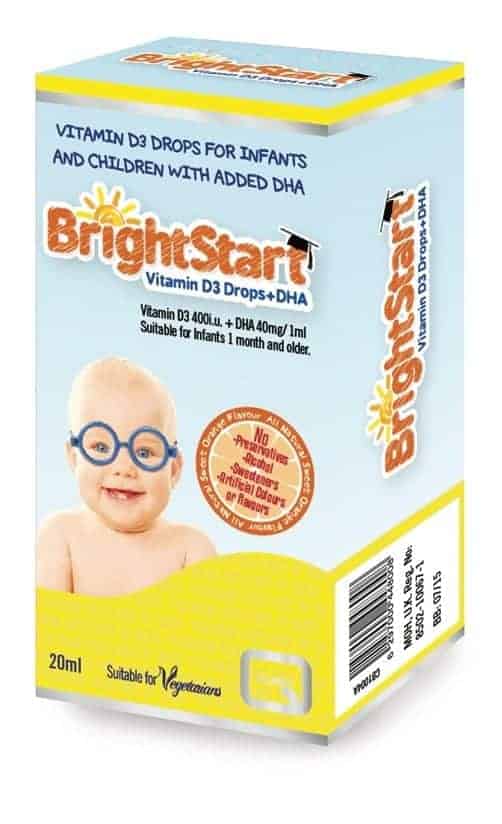With fussy eating children we have to make sure that we give our Beans vitamin supplements to keep them strong and healthy. Brightstart is the new kid on the block as far as children’s vitamins are concerned. Brightstart is the new Vitamin D3 for infants from Quest Vitamins and it is head and shoulders above the rest.
BrightStart provides the well-accepted 400iu of Vitamin D combined with essential nutrients; Vitamins A, E and DHA. BrightStart is suitable for children aged 1 to 5 years old and its vegetarian friendly formula is perfect for fussy eaters, as it comes in tasty sugar free, natural orange flavoured droplets.
 BrightStart: the right start for children
BrightStart: the right start for children
BrightStart ensures that your child gets their RDA of Vitamin D, which contributes to:
- Bone development
- Normal function of the immune system and muscles
- Maintaining healthy teeth in children
0–2 years old is also the key period when infants require DHA for the development of their brain and to secure their longer-term neuro-cognitive function.
Both Vitamin D and DHA are two key nutrients that can be deficient during this crucial period of life, making BrightStart a great insurance and starter nutrient for infants.
What is DHA?
DHA is an omega-3 fatty acid, especially required during foetal and child development for the growth and functional development of the brain, eyes, heart and central nervous system.
Prenatal and early postnatal DHA status is important for the later visual function, neurological and cognitive development of a child. DHA status may also have a possible role in some behavioral and mood disorders affecting children.
The natural choice for parents
BrightStart benefits from being free from contaminants, giving parents added piece of mind. BrightStart is proud to be free from:
- Preservatives
- Alcohol
- Sweeteners
- Sugar
- Artificial colours and flavours
How can normal sources of DHA intake in this 0-2 years old period be compromised?
Maternal breast-milk may not have sufficient DHA if the mother did not have adequate DHA intake during pregnancy and does not have an adequate DHA intake during breast-feeding, which seems to be the case in most developed-countries.
Many milk formulas are loaded more towards DHA precursors, like ALA, which are very poorly converted to DHA in the body, less than 1% conversion.
Is there any real risk of vitamin D deficiency?
- The prevalence of vitamin D deficiency has increased and rickets has re-emerged in the UK and other developed countries as a public health problem.
- Infants, toddlers and adolescents as well as ethnic minorities (e.g. Asian, African Caribbean and Middle Eastern) are particularly likely to be vitamin D deficient or to have a higher risk of rickets.
- Also at risk are breast fed babies and toddlers without receiving vitamin supplements or those whose mothers did not have vitamin D supplements during pregnancy*
- The UK Department of Health recommends that all infants and young children aged 6 months to 5 years should take a vitamin D supplement.
BrightStart is available from all good health stores and online at www.questexcellence.com at £7.99
